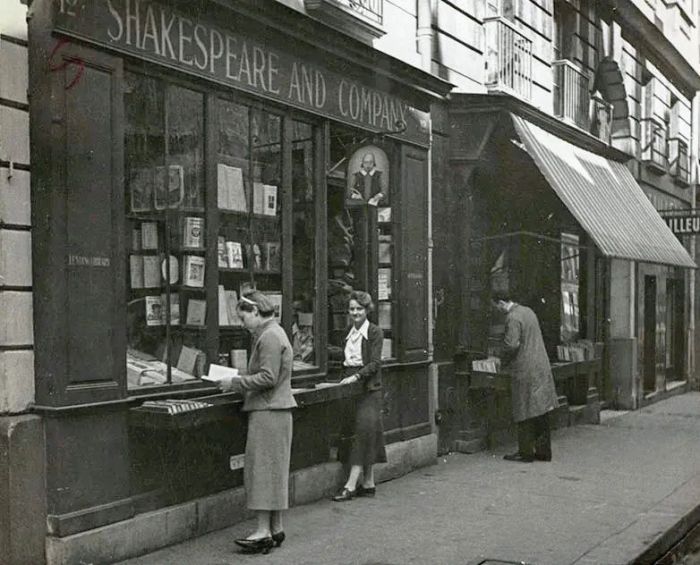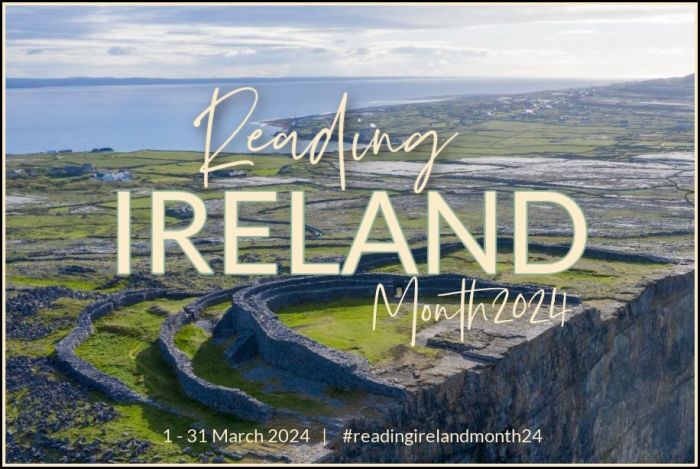
The Lost Bookshop by Evie Woods.
One More Chapter, 2024 (2023).
‘The thing about books,’ [Martha] said, ‘is that they help you to imagine a life bigger and better than you could ever dream of.’ — Epilogue.
Hovering between magic realism and fantasy, romance and historical fiction, The Lost Bookshop slyly plays with the reader’s expectations of a straightforward narrative. How can a bookshop be lost? Who are Opaline, Martha and Henry, and how – and more to the point, why – are their lives fated to intersect?
A twisting intertwining plotline, like the roots and branches of a tree, takes in townhouses in Dublin and London, a famous Paris bookshop, an institution in Connacht, a dilapidated building in Italy and the First World War battlefields of Northern Europe, and involves births, deaths, liaisons, failed marriages and family secrets. We fairly accurately guess at some of the connections but others will elude our suspicions till the very end.
However, as Opaline tells us in Chapter 1, ‘A book is never what it seems,’ alerting us to the need to peer behind and beyond the words on the page; her words are unconsciously echoed by a tipsy Henry a few chapters later when he bombastically declares, ‘A book is so much more than a delivery vehicle for its contents.’ What are we expected to glean from these portentous pronouncements?

Of course a book about a bookshop is full of references to books. Titles of children’s books, classics, contemporary novels, even illuminated manuscripts, they all get name-checked. But we are invited to consider two works in particular – the synopsis of the putative second novel by Emily Brontë, and a children’s novel called A Place Called Lost – for these will furnish the crucial mechanisms that drive the plot … as also will text not written on pages but inked and sewn.
Yet books are nothing without authors, readers, and even wheeler- dealers; and so the lives of booklovers Opaline, Martha and Henry are intimately bound up not just with each other but with their own complex family histories and relationships with associates: stories of abuse, addictions, trauma, betrayal, incarceration, mutism, obsession, misogyny and PTSD, but also trust, friendship, and love.
It’s impossible to go into further details without giving away unforgivable spoilers so it’s probably best just to reveal my personal reactions. Writing as Evie Woods the author Evie Gaughan tells an engaging but also tantalising story, one moreover that I feel is built on essential and sometimes distressing truths, as when Opaline muses ‘that men in particular seem to need a war to find meaning in what they already have.’ If at times I found it hard to suspend disbelief in how certain characters chose to act or react, that didn’t stop me wanting to read on.

For all the realism portrayed in terms of social conditions prevalent in Britain and Ireland in the last century and through the antediluvian attitudes of many men towards women, the truly fantastical uncompromisingly threads its way through the narrative. You may be the kind of reader who’s accepting of such magic or the sort for whom the supernatural, fate and all the rest is anathema, but there’s no escaping this aspect; after all its presence is implicit in the very title of the book! It does mean though that it’s rarely possible to predict what situation will arise when you turn the page.
I’ll leave you with a pronouncement from the enigmatic Madame Bowden, Martha’s employer and landlady, which warns against complacent acceptance of the humdrum in life and the solace of the ordinary.
‘… if you’re not scared, then you’re not living.’ — Eileen Bowden.
For the protagonists in this novel there are indeed scares aplenty; does this however mean they’ll survive all that’s thrown at them?

The second title I’ve read for Cathy at 746books.com’s #Begorrathon24

Bookstores lost their appeal long ago: they are not designed for the mobility-impaired, and seem designed to make it even more difficult to find anything than necessary.
They often carry only the latest – and you can’t fill in a series. The staff are rarely what the fantasy of it-used-to-be – people who read and loved books. They go straight to the computer when you ask a question – I could do that myself.
LikeLike
I’m sorry that’s your experience with bookstores where you are, Alicia, and it’s not uncommon. Thankfully for me the bookshops I frequent here are mainly staffed by booksellers and assistants who are knowledgeable, who love the books they read, and only use a computer to see how quickly they can deliver a book order.
Yes, many bookshops are in premises that are not easily adaptable to those who are mobility impaired but the bigger chains which function on multiple levels (Waterstones in the UK, for example) have often installed lifts, say, or included wheelchair ramps to accommodate those with mobility issues.
Of course, this novel is about bookshops in the 1920s and 1930s (such as the original Shakespeare and Company in Paris) and the titular shop was originally a timber-framed building transported from Italy to Dublin, so with no mod cons or concessions for those with disabilities.
LikeLiked by 2 people
Books about bookshops or about books in general always seem to appeal to me. It’s not just reading that’s enjoyable, but reading about reading too for some reason.
That Shakespeare & Co photo is lovely, really captures times gone by.
I’m reading Northanger Abbey at present and I like Catherine’s enthusiasm for Gothic fiction, and the way she wants to talk about her reading to anyone who will listen.
LikeLiked by 1 person
I want to embark on a re-read of all of Austen’s novels – probably starting in August, which is when I’ve tended to follow the now-defunct Austen in August meme – and I shall probably commence with Northanger Abbey, one of her early novels though one of the last to be published. I’m looking forward to what you have to say about it when you’ve finished it!
Yes, reading about reading books always seems to result in double the pleasure, which is why I picked up this title by Woods. 🙂 And in fact I’m currently reading an anthology of commissioned poems about bookshops which I bought back in 2016 and am stunned it’s taken me till now to do more than just dip into it.
LikeLike
So much to look forward to in a re-read, it’s something I should do more of too.
I’m enjoying NA but definitely not as much as Persuasion. For some reason I don’t feel like the writing flows as easily, but that could be down to it being an earlier novel maybe? Or the fact that I was so charmed by Persuasion that it’s a lot to live up to 😀
LikeLiked by 1 person
In my mind Northanger Abbey is, both literally and figuratively, a novel of two halves, like sketches for two novels which have been patched together. Persuasion, on the other hand, is much tighter and, because shorter, that much more focused. Having said which, I like both!
LikeLiked by 1 person
I really hope I can get this one read in this last week of March – you’ve made it sound like a great read. Thanks Chris!
LikeLiked by 1 person
Yes, I remember you said you had a copy of this and you were hoping to get to it this month. 🙂 It’s an interesting read, a real mix of comfort and jeopardy, romance and social commentary.
LikeLiked by 1 person
Pingback: Reading Ireland Month 2024 is here!